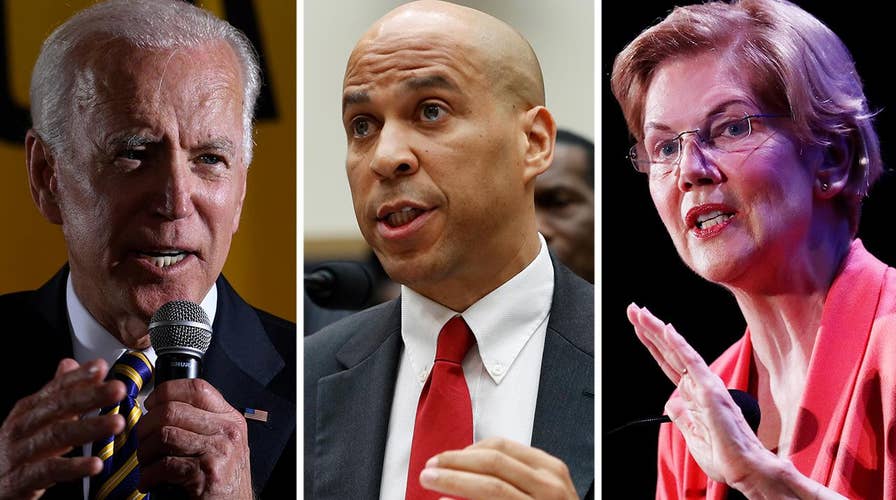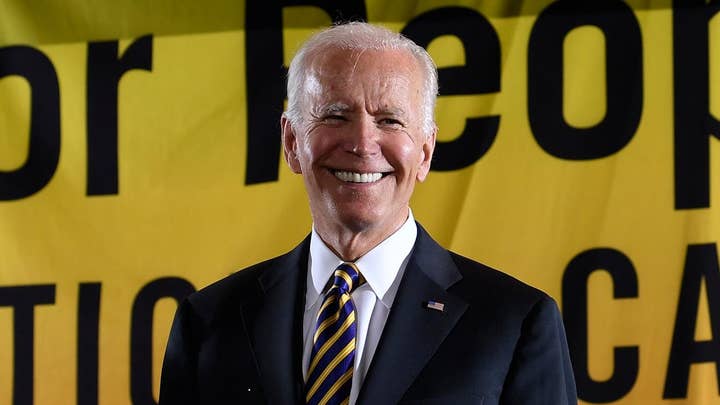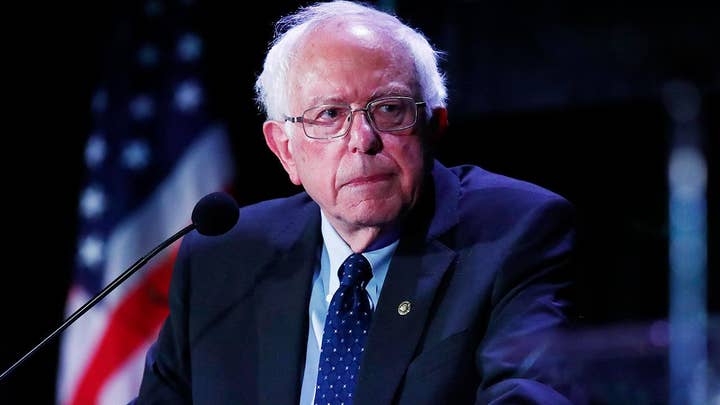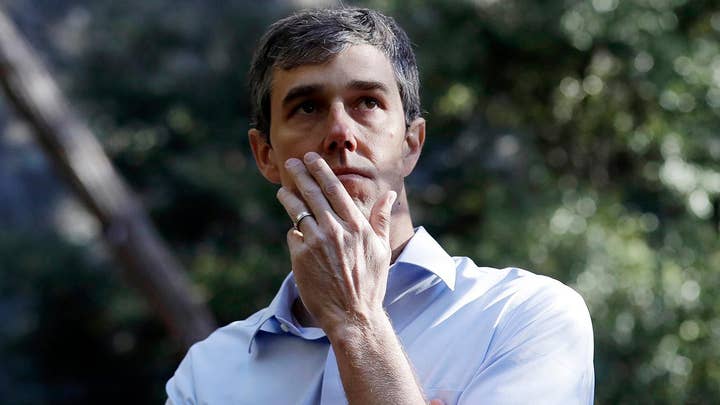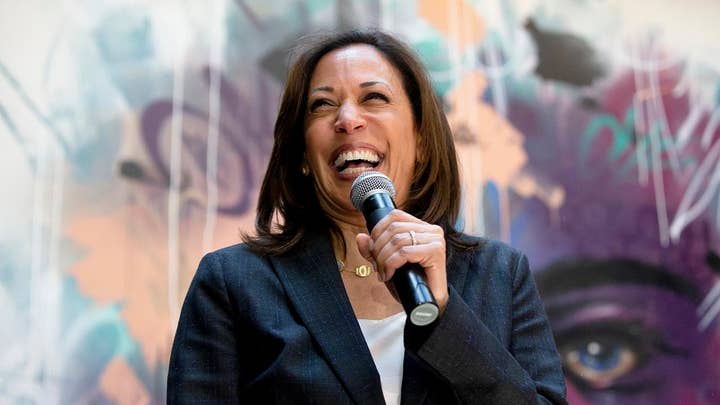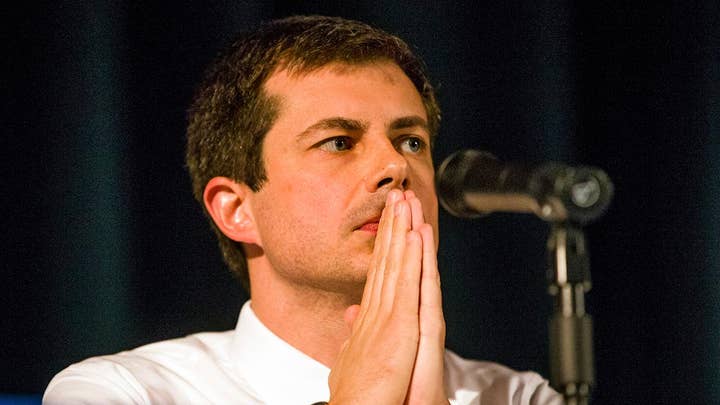Which presidential candidate has the most to lose in the upcoming Democratic debate?
Campaign strategist John Thomas weighs in on 'Fox & Friends First.'
Will Joe Biden appear out of step with today’s progressives? Will Elizabeth Warren struggle with questions over her ancestry claims? Will Bernie Sanders show irritation with the questions?
With 20 candidates crowding the first debate stage of the cycle over the next two nights, the Democrats running for president will be fighting for every second of air time, hoping for a stand-out moment that distinguishes them from their rivals.
But they are also hoping those precious minutes of attention in Miami won’t shine a light on their apparent political weaknesses, as they seek to convince Democratic voters they are best to take on President Trump in 2020.
“Preparing for this debate, the candidates have to figure out a way to basically stand out and to also draw a contrast with each other,” former Democratic National Committee leader Donna Brazile said on Fox News’ “America’s Newsroom."
While some Democrats may be able to use the debate to “get out of the so-called box,” Brazile said, other candidates “might prove that maybe this is not their time.”
Here are some of the pitfalls the top-tier candidates will likely hope to avoid:
Front-runner Without a Party
Though he leads in nearly all national and early state polls, Joe Biden’s chief mission in the debates will be to avoid the impression that he’s out of touch with today’s progressive Democratic Party in both substance and style. That’s something Biden – who spent 44 years in Washington as a senator and vice president – has struggled to overcome.
Before entering the contest earlier this year, Biden was forced to release a video vowing to be "more mindful about respecting personal space in the future," amid complaints from women of unwanted physical contact from Biden during political events. Biden explained that as a politician, he would sometimes touch voters while talking to them “to show I care about them and I'm listening.” It has forced Biden to answer awkward questions amid the #MeToo movement.
More recently, Biden has refused to back down from comments touting his ability as a senator to work with segregationist southern senators. He has used that line to lament the end of civility in Washington, saying elected officials used to able to talk to each other and get things done, even when they vehemently disagreed with each other. Still, some of his Democratic primary rivals, including African-American Sens. Kamala Harris and Cory Booker, have criticized Biden for his comments and said he shouldn’t be proud of his past relationships with segregationist senators.
And then there are the policy positions: Biden reversed his position in support of the so-called Hyde Amendment – which bars taxpayer-financed abortions -- after an outcry from liberals. Biden hasn’t endorsed "Medicare-for-all," a favorite health care plan of the progressive base. His role in crafting tough crime legislation in the 1990s is back in the spotlight. And while Biden released an ambitious climate plan, his campaign faced claims it plagiarized portions of it.
The Angry Socialist
Bernie Sanders, the Vermont senator and runner-up in the 2016 Democratic primary, also consistently polls at the top of the Democratic field, boasting an ardent following of young progressives attracted to his democratic socialist platform. But can Sanders keep cool when confronted with questions he doesn’t like?
In previous interactions with journalists, Sanders has shown a tendency to turn irritable.
Pressed by a New York Times reporter about his activism related to Nicaragua while a mayor in the 1980s, a frustrated Sanders shot back that “with all due respect, you don’t understand a word that I’m saying.”
During a Fox News town hall in April, Sanders began laughing dismissively when anchors Bret Baier and Martha MacCallum asked him why he was holding onto his wealth rather than refusing deductions or writing a check to the Treasury Department. He instead asked why MacCallum didn't donate her salary. “I didn’t suggest a wealth tax," MacCallum responded.
Dude, Where’s My Policy?
Beto O’Rourke, the former Texas congressman who nearly defeated Texas Republican Sen. Ted Cruz in one of the most closely watched races last year, entered the 2020 Democratic race with much fanfare and a front-page cover on Vanity Fair magazine.
But since then, O’Rourke’s poll numbers have plummeted, and he’s battled the impression that while charismatic, he’s light on policy details.
Earlier this year, O'Rourke faced criticism after an especially unflattering interview in The Washington Post portrayed him as equivocal and unsure on a variety of substantive policy issues -- and included a comment that seemed to question the modern-day relevance of the U.S. Constitution. Asked what could be done about illegal immigrants who overstayed their visas, O'Rourke told the paper at the time, “I don’t know."
O’Rourke has since released campaign platforms on climate change and on immigration, calling for a pathway to citizenship for the 11 million illegal immigrants in the country. But watch to see if O’Rourke can avoid platitudes and appear as a serious policy-minded candidate when he appears on the debate stage.
Law and Order Overload
Kamala Harris, the California senator who was once California’s attorney general and San Francisco’s district attorney, has used her prosecutorial background during high-profile congressional hearings to portray herself as a fighter at a time Democrats want a nominee who can go toe-to-toe with President Trump.
While her style has won high marks from liberals, Harris has also faced progressive criticism over her record. In a New York Times op-ed earlier this year, Lara Bazelon, a University of San Francisco associate law professor, wrote: “Time after time, when progressives urged her to embrace criminal justice reforms as a district attorney and then the state’s attorney general, Ms. Harris opposed them or stayed silent.” Bazelon also wrote, “Most troubling, Ms. Harris fought tooth and nail to uphold wrongful convictions that had been secured through official misconduct that included evidence tampering, false testimony and the suppression of crucial information by prosecutors.”
The question for Harris is whether she can use her prosecutor past as an asset while effectively answering the criticism of her record. After entering the race this year, Harris said she regretted how certain cases were handled while she worked as a top state prosecutor in California, but defended her actions.
“I had a host of clients that I was obligated to defend and represent,” Harris said at a press conference when she announced her campaign. “And I couldn’t fire my clients. And there were unfortunately situations that occurred where my clients took positions that were contrary to my beliefs.”
Tribe-ulations
Elizabeth Warren, the progressive favorite and senator from Massachusetts, has seen her poll numbers rise in recent weeks as she has sought to portray herself as a wonkish, policy-focused candidate. But she still can’t shake the controversy over her past claims of Native American ancestry.
While Trump has repeatedly dismissed her as “Pocahontas,” it’s not just Republicans asking her questions about her past claims. Last month, a radio interview turned awkward after the host pressed Warren over her past claims of Native American ancestry and told her, “You're kind of like the original Rachel Dolezal.”
During an interview with “Charlamagne tha God” on the syndicated radio show “The Breakfast Club,” Warren acknowledged regret over her past claims.
“I'm not a person of color, I'm not a citizen of a tribe,” Warren said. “And I shouldn’t have done it.”
Warren has explained that the reason she claimed ancestry in the past was because she was told stories about her heritage from her family. But last year, she released the results of a DNA test showing she is only between 1/64th and 1/1,024th Native American -- and apologized for identifying as Native American on past forms.
Warren has denied benefiting from her ancestry claims, including when she was applying for jobs.
South Bend Storm
It’s no question that Pete Buttigieg, the 37-year-old Indiana mayor, has been the break-out star of the primary so far. Barely known to a national audience before he entered the race, Buttigieg has used well-received media appearances to grow a following and establish himself as a top-tier candidate, arguing he has more executive experience as mayor than either Trump or Vice President Pence had before being elected.
Now, his mayoral duties are turning into a potential liability.
Buttigieg – who despite his rise has struggled to attract black voters – now finds himself struggling with the racial unrest back home in South Bend, as the city deals with a deadly police-involved shooting.
“Right now, my hometown of South Bend is hurting,” Buttigieg wrote in a recent email to supporters. “This past weekend, a member of our South Bend community – a Black man named Eric Logan – lost his life at the hands of another member of our community – a white police officer.”
Buttigieg, who canceled events on the campaign trail to deal with the controversy, has also been ripped by the city’s police union, which released a statement saying, “Mayor Buttigieg’s focus on this incident is solely for his political gain and not the health of the city he serves.”
Expect Buttigieg to face questions about his leadership.
Fox News’ Gregg Re contributed to this report.




















